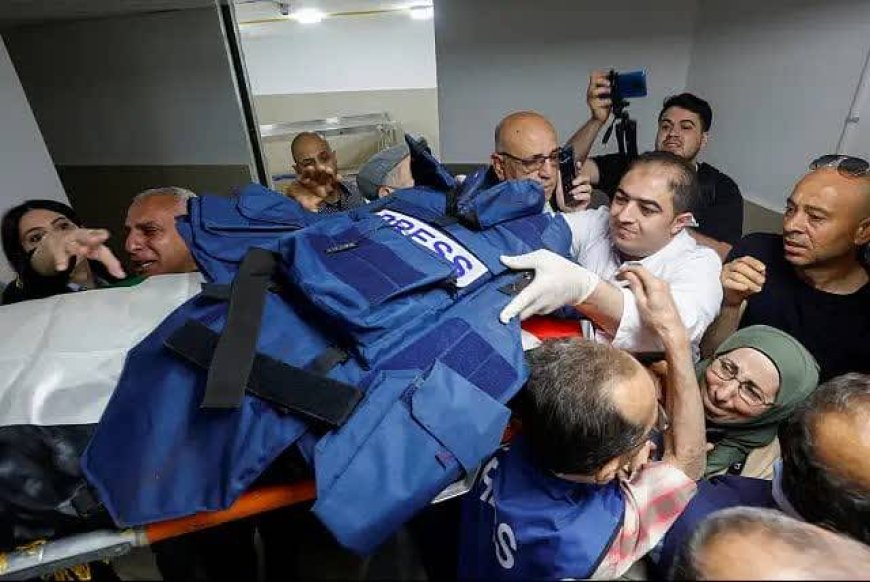Not just Shireen: How the Zionist regime has murdered scores of journalists in occupied Palestine

By: H. Zaïm-Bashi
Furthermore, foreign and local journalists face severe consequences for their efforts to uncover the truth, including arrest and, in some cases, fatal gunfire. There is a mounting concern among the Zionist leadership regarding the significant impact of media coverage concerning the massacres they commit in the Palestinian occupied territories. Therefore, the Israeli government is relentlessly seeking to present a narrative that differs from the truth regarding the everyday plight of Palestinians.
The Israeli occupation of Palestine has been plagued by numerous instances of barbarity, including assaults on members of the press who are attempting to cover the developments on the ground. The tragic death of Shireen Abu Akleh, the Palestinian-American journalist who worked as a correspondent for the Arabic-language channel Al Jazeera, last year serves as a poignant reminder of the dangers faced by those seeking to document the ongoing Zionist crimes. Back in 2002, the Zionist regime gunned down several journalists, namely Issam Hamza Tillawi, Mad Sobhi Abu Zahra, Amjad Behjat Al-Alami, Jamil Abd Allah Nawara, Ahmed Noaman, and Raffaele Ciriello. Other journalists like Mohammad Abdul-Karim Al-Bishawi (2001), Othman Abdul-Qader Al-Qatan (2001), and Aziz Youssef Al-Tanh (2000) were also martyred by the Zionist regime.
Also, according to the Ministry of Information of Palestine, the Zionist regime has been accused of illegally detaining journalists and subjecting them to heinous torture in secret prisons. These journalists are reportedly being deprived of their fundamental human rights, which have been approved by international conventions. In 2012, the Zionist regime was responsible for the deaths of Palestinian reporters in prison, including Muhammad Musa Abu Eisha, Mahmoud Ali Ahmad al-Koumi, and Hossam Salameh Mohammed.
Other journalists, such as Cevdet Kiliclar (Turkish, 2010), Alaa Hammad Mahmoud Morteji (2009), Ihab Jamal (2009), Hassan Al-Wahidi (2009), Basil Ibrahim Faraj (2009), Omar Abdel-Hafiz Al-Silawi (2009), Fadel Sobhi Shana’a (2008), Hassan Ziad Shakura (2008), Mohammad Adel Abu Halimah (2004), Khalil Muhammad Khalil Al-Zaben (2004), James Henry Dominic Miller (British, 2003), Nazih Adel Darwaza (2003), Fadi Nashaat Alawneh (2003), were all brutally murdered by the Zionist troops.
It is a well-known fact that journalists are confronted with numerous restrictions from the Zionist forces when covering Palestinian demonstrations or clashes in the occupied West Bank and East Jerusalem. As a matter of fact, it is not uncommon for Zionist troops to use tear gas against media members, leading to a collective effort among journalists to protect themselves against any potential danger. The latest report from the Committee to Protect Journalists (CPJ) has revealed an alarming pattern in the Israeli approach to reporters. According to CPJ findings, there have been no fewer than 20 documented cases of journalists being murdered by the Israeli military since 2001.
The overwhelming majority of these civilian victims were Palestinian, raising serious concerns about the safety of journalists. It is worth noting that, thus far, no charges have been brought against the Zionist regime in relation to these horrible killings. Shockingly, out of the twenty journalists who lost their lives, thirteen of them had unambiguously identified themselves as members of the media or were travelling in vehicles that displayed press insignia at the time of their deaths.
For instance, Fadel Shana'a, a photojournalist for Reuters, was shot and died in a terrible incident that occurred back in 2008, despite the fact that he was wearing a protective vest that was plainly marked with the phrase "Press." He was shot while standing next to a vehicle with a similar "Press" sign. Shana'a was shot in the chest and the leg, a tragic event that has become all too common in occupied Palestine.
The recently released report by the Committee to Protect Journalists (CPJ) sheds light on a discernible pattern in the treatment of journalists by the Zionist regime. This trend is deemed to be a recurring sequence within the regime's military operation. The Zionist military's handling of inquiries into the fatalities of non-combatants, including members of the press, has been labelled the "black box" by the CPJ. The Zionist authorities have been accused of refuting witness accounts and frequently placing blame on the victims themselves for the killings, resulting in their exoneration during investigations.
As is customary in such cases, the findings of said investigations are being held under strict confidentiality. According to the CPJ, the Israeli military's investigations into journalist killings are often protracted, taking several months or even years. Moreover, the families of the deceased journalists, who are predominantly Palestinian, are left with limited options to pursue justice. According to the CPJ's report, the likelihood of a recurrence of these murders by the Zionist military remains high.
It is worth noting that the inhumane killing of a journalist constitutes a war crime and a crime against humanity, sending a warning message to journalists and media personnel operating in the West Bank and Gaza Strip. In conclusion, it should be noted that despite all of the Zionist regime's attempts to suppress the Palestinian nation, the global public has come to see the true nature of the fake Zionist regime.
In recent times, the United States, which has been a staunch advocate and proponent of the Zionist regime, has undergone a dramatic shift in its unwavering support for Tel Aviv in response to mounting public pressure. During Netanyahu's tenure as prime minister in 1994, the Zionist regime relied heavily on financial aid from the United States and Europe, with 70% of its budget being financed by these sources. However, in present times, citizens of Western nations are expressing their displeasure towards funding what they perceive as a regime of criminal gangs.













































